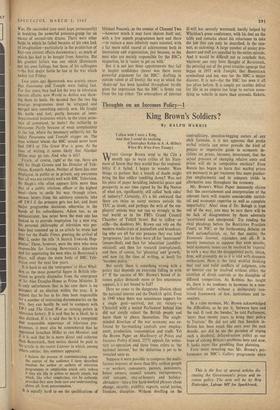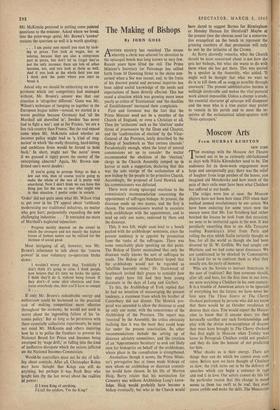Thoughts on an Incomes Policy-1
King Brown's Soldiers?
By RALPH HARRIS
I often wish 1 were a King,
And then I could do anything . . .
(Christopher Robin in A. A. Milne's Wizen We Were Very Young.) WHEN George Brown went to the City a month ago to warn critics of his State- ment of Intent that they would bear the responsi- bility if it failed, I began to wonder. Were things so parlous that a breath of doubt might bring the fine edifice tumbling down? Was not his piece of paper heralding industrial peace and prosperity in our time signed by the Big Names of what are, significantly, still called 'both sides' of industry? Certainly, it's a bit awkward that there are twice as many earners outside the TUC as inside, and perhaps the writ of the em- ployers' unions may not run so strongly in the real world as in the FBI's Grand Council Chamber of Tothill Street. But to stiffen—or stifle—the doubters Mr. Brown can rely on the modern media-crats of journalism and broadcast- ing who are all for any panacea they can label 'progressive,' just as they were all for 'investment' (unspecified), and then for 'education' (undiffer- entiated), and then for research (unexplained), and then, of course, for 'planning' and 'growth,' and now (at the time of writing, at least) for 'incomes policy.'
But surely there is something wrong with a policy that depends on everyone falling in with it? If the success of Mr. Brown's brand of in- comes policy demands more or less unanimous support, is it not bound to fail?
Here we come to the dangerous illusion about the national interest and the Dunkirk spirit. Even in 1940 when there was unanimous support for a single goal—survival, not yet victory—a Churchill with a united Parliament behind him did not simply exhort the British people and leave them to please themselves. The single- minded direction of the war economy was en- forced by far-reaching controls over employ- ment, production, consumption and trade. Yet the Brown Paper on Machinery of Prices and Incomes Policy (Cmnd. 2577) appeals for volun- tary co-operation and three times refers to 'the national interest,' but the definition is yet to be revealed unto us.
Suppose it were possible to compress the multi- farious interests of more than fifty million people —as workers, consumers, parents, pensioners, house owners, council tenants, entrepreneurs, civil servants, stay-at-homers and holiday- abroaders—into a few hard-worked phrases about change, security, stability, exports, social justice, freedom, discipline. Without dwelling on the
contradictory, question-begging nature of any such formulae, is it not apparent that prolix verbal criteria can never provide the kind of precise or imperative guide to economic de- cisions on prices, incomes, investment, that the actual pressure of changing relative costs and prices will do in competitive markets? Even Russia has begun to learn that market prices are necessary to get resources into more produc- tive employments and to compare yields in alternative uses throughout the economy.
Mr. Brown's White Paper innocently claims that 'the ascertainment and interpretation of the relevant facts will require considerable statisti- cal and economic expertise as well as complete impartiality.' Alas! even if Dr. Balogh is kept out of the way, you may be sure there will be no lack of disagreement by those adversely 'ascertained and interpreted.' Try reading the rival pleadings before the Restrictive Practices Court, or NIC, or the forthcoming debates on steel nationalisation, or, for that matter, the Economic Journal, rejoinders and all. It is merely immature to suppose that even specific, local economic issues can be resolved by 'experts' in such a way that the disappointed party, union, firm, will promptly do as it is told with dynamic enthusiasm. Here is the fatal wishful thinking that real and valid conflicts of judgment, aim or interest can be resolved without either the coercion of direct controls or the discipline of diffused competition. As Robbins has taught us, there is no tendency to harmony in a non- collectivist order without a deliberately con- trived framework of law, institutions and in- centives.
In a calm moment, Mr. Brown acknowledged the difficulties, as he put it, 'between here and the end. It took the Swedes,' he told Parliament, 'more than twenty years to bring their policy to fruition.' He did not add that Swedish in- flation has been much like ours over the past decade; nor did he see the paradox of urging such a doubtful, delayed-action policy as our hope of solving Britain's problems here and now. It looks more like gambling than planning.
Even more revealing was Mr. Brown's per- formance on BBC's Gallery programme when Mr. McKenzie persisted in putting some pointed questions to the minister. Asked where we break into the price-wage spiral, Mr. Brown's 'answer' restates the question so well it is worth quoting:
. . . I am pretty sure myself you start by look- ing at prices. You look at wages, too, or salaries, because they arc also a component part in prices, but don't let us forget they're not the only incomes; there are lots of other incomes, too, and you look at those as well. And if you look at the whole field you can I think pick the point where you start to break it.
Asked why we should be embarking on an ex- periment which our competitors had managed without, Mr. Brown's answer was that our situation is 'altogether different.' Gone was Mr. Wilson's technique of lumping us together in the European league tables—instead, we started in a worse position because Germany had 'all the Marshall aid shovelled in'; Sweden 'has never had to fight a war'; and as for France, 'we are a less rich country than France.' But the real expose came when Mr. McKenzie asked whether an incomes policy might lead to 'a kind of stag- nation' in which 'the really thrusting, hard-hitting and ambitious firms would be forced to hold back.' In short, might not 'the norm' (even if we guessed it right) prove the enemy of the enterprising abnorm? Again, Mr. Brown con- firmed one's worst doubts: If you're going to arrange things so that a few can win, then of course you're going to make the whole of the rest of it pretty well anarchical. Now I don't think we can have this thing just for the one or two who might win in that situation. I prefer order in society.
'Order' did not quite seem what Mr. Wilson tried to put over in his TV appeal about 'ruthlessly modernising our traditional industries, no matter who gets hurt; purposefully expanding the new challenging industries . . .' It reminded me more of Marshall's neglected injunction: Progress mainly depends on the extent to which the strongest and not merely the highest forces of human nature can be utilised for the increase of social good.
Most intriguing of all, however, was Mr. Brown's reluctance to talk about the 'reserve powers' in case voluntary co-operation broke down: I wouldn't worry about that. Truthfully I don't think it's going to arise. I think people now believe that it's time we broke the spiral. I think they'll do it, without being forced. If they don't—if some idiot obstructs and frus- trates everybody else, then you'll have to compel it . . .
if only Mr. Brown's redoubtable energy and enthusiasm could be harnessed to the practical task of making competition more effective throughout the economy, he would not need to worry about the impending failure of his 'in- comes policy.' But so long as he perseveres with these essentially collectivist experiments, he must not mind Mr. McKenzie and others inquiring how he is to police the frontiers to prevent his National Board for Prices and Incomes being swamped by 'wage drift,' or falling into the kind of ineffective disrepute which the unions inflicted on the National Incomes Commission.
Would-be controllers must not be shy of talk- ing about controls. After all, Christopher Robin may have thought that Kings can still do anything, but perhaps it was Pooh Bear who taught him (by the last verse) about the realities Of power:
If I were King of anything.
I'd tell the soldiers, 'I'm the King!'



































 Previous page
Previous page